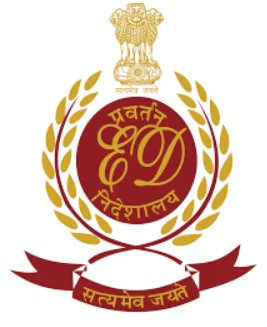
ED Full Form stands for Enforcement Directorate, a premier investigative agency in India tasked with upholding economic laws and protecting the country from financial crimes. Operating under the Department of Revenue, Ministry of Finance, the Enforcement Directorate is a multi-disciplinary organization entrusted with the responsibility of investigating offenses related to money laundering, foreign exchange violations, and fugitive economic offenders.
Interested candidates must read on to understand what is ED Full Form, ED roles and responsibilities, its statutory powers, history, and significance in India’s financial governance.
The ED Full Form is the Enforcement Directorate. It is an economic intelligence and law enforcement agency of the Indian Government responsible for enforcing laws to prevent money laundering and regulate foreign exchange dealings. Established on May 1, 1956, ED plays a key role in safeguarding the country from illicit financial activities.

The ED was created to investigate violations under various economic laws, particularly:
| ED Overview | |
| Particulars | Details |
| ED Full Form | Enforcement Directorate |
| Year of Establishment | 1st May 1956 |
| Established Under Which Act | Initially under FERA, 1947; currently under PMLA, 2002; FEMA, 1999; FEOA, 2018 |
| ED Functions Under Which Ministry | Ministry of Finance, Department of Revenue |
| Headquarters | New Delhi, India |
| Primary Objective | Enforcement of economic laws and prevention of money laundering |
| Key Legislation Enforced | PMLA (2002), FEMA (1999), FEOA (2018), FERA (1973 – repealed) |
| Main Responsibilities | Investigating financial crimes, attaching assets, and prosecuting offenders |
| Current Administrative Control | Department of Revenue, Government of India |
| Initial Name | Enforcement Unit (1956) |
| Renamed As the Enforcement Directorate | 1957 |
| First Headquarters | Delhi |
| First Branches Opened | Bombay and Calcutta |
Understanding the ED meaning requires a look into its origin. The Directorate of Enforcement was first formed as an Enforcement Unit under the Department of Economic Affairs for handling violations of the Foreign Exchange Regulation Act, 1947 (FERA ’47). Initially headquartered in Delhi with branches in Bombay and Calcutta, the Unit was renamed as the Enforcement Directorate (ED) in 1957, with another branch at Madras.
In 1960, administrative control of the ED was moved to the Department of Revenue, marking the beginning of its modern structure. Over the decades, the Directorate evolved from handling exchange control violations to tackling high-profile economic crimes like money laundering and the recovery of proceeds from criminal activities.
To fully understand ED Full Form and its institutional framework, it is essential to explore the background of its formation and the legislative acts under which it operates. Knowing ED established in which year and ED established under which act helps in comprehending the legal authority it holds in tackling economic crimes in India.
The legal foundation of ED continued to strengthen with the enactment of the Fugitive Economic Offenders Act, 2018 (FEOA), and its role as a sponsoring agency under the COFEPOSA Act, 1974. Today, the ED enforces multiple economic laws with a significant mandate to safeguard India’s financial system.
To understand what is ED department work, we must explore the legislation it enforces:
These Acts form the core legal framework guiding the ED roles and responsibilities.
The ED roles and responsibilities cover a broad spectrum of enforcement, from investigation to prosecution:
ED enforces key financial legislations such as:
The ED investigates offenses of:
The Directorate is empowered to attach properties derived from proceeds of crime, initiate prosecution, and ensure confiscation through Special Courts.
Through provisional attachment and subsequent legal procedures, ED ensures properties involved in illegal transactions are seized.
Under the COFEPOSA Act, ED acts as a sponsoring agency recommending preventive detention of individuals involved in smuggling or foreign exchange manipulations.
Many often ask, What is ED department work? It can be summarised as:
Understanding the organisational hierarchy is essential for comprehending the ED roles and responsibilities. Here’s the typical structure:
Additionally, officers from the Indian Revenue Service (IRS), Indian Police Service (IPS), and other central services are often deputed to the ED.
In the modern era of digital transactions and transnational crimes, the Role of the Enforcement Directorate has become increasingly vital. It combats:
Through its proactive investigations and strategic enforcement actions, ED helps preserve financial transparency and sovereignty.
In summary, the ED Full Form – Enforcement Directorate – symbolises a strong mechanism for preserving India’s economic sovereignty. Established in 1956, this organisation has grown in stature and scope, enforcing key legislations like PMLA, FEMA, and FEOA.
Whether it’s investigating cross-border financial fraud or tracking down fugitives hoarding black money abroad, ED remains at the forefront of India’s fight against financial crime. Understanding what is ED Full Form, ED roles and responsibilities, and its statutory backing helps one appreciate its crucial role in national governance.
Ready to boost your UPSC 2025 preparation? Join PW’s UPSC online courses today!
<div class="new-fform">
</div>